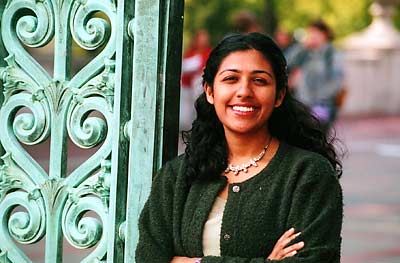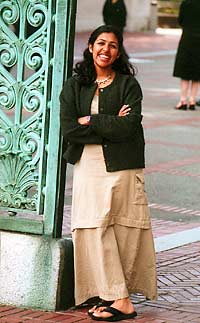
Shayna
Parekh is the 2002 University Medalist, the top honor at UC Berkeley
for a graduating senior Photo, Peg Skorpinski |
This year's top
senior at UC Berkeley plans future in her family's past, will receive
University Medal on May 17
7
May 2002
By
Janet Gilmore, Media Relations
Berkeley
- Sixty years ago, Shayna Parekh's maternal grandfather left India for
a better life in Tanzania. Her parents, who grew up in East Africa and
England, also left their home - to pursue opportunities in America.
And now
Parekh, born and raised in sunny Southern California, plans to purchase
a one-way ticket to India. She will graduate this month with a bachelor's
degree from the University of California, Berkeley, and an intense passion
for improving the lives of others.
A political
science and interdisciplinary studies major, Parekh has been selected
to receive this year's University Medal, the top honor at UC Berkeley
for a graduating senior with outstanding accomplishments, including a
grade point average of at least 3.96.
The medal
will be given to Parekh on May 17 at the campus's Commencement Convocation.
As University Medalist, she will give a speech at the ceremony, which
honors all students graduating from UC Berkeley.
Parekh
plans to use the knowledge she gained at UC Berkeley - the classroom
learning, the words from powerful visiting speakers, the life-changing
study abroad sessions in Africa and India - to improve the lives of individuals
living in India and perhaps other developing countries.
"I've learned
that individuals can change the world by helping one person at a time,"
she said. "Teaching just one illiterate parent to read is something that
touches that entire family."
Parekh,
21, has been heavily influenced by her family's push for a better way
of life. During the 1960s, her maternal grandfather fled Uganda for England,
forced out by Idi Amin. Her grandparents were grocers and gas station
owners. Her father is an aerospace engineer and her mother, a former
school teacher turned businesswoman.
Parekh
also grew up with a deep appreciation of her spiritual faith and its
teachings. She said this includes the tenet of Ahinsa or nonviolence,
a principle that Jains teach and practice toward not only human beings,
but toward all of nature, including plants and animals. She also is mindful
of the tenet that states, she said, that there are unlimited sides to
every issue, and that human beings, limited in their knowledge, should
try not to judge or act before pursuing their own independent investigations
of the truth.
| |

Shayna
Parekh Photo,
Peg Skorpinski
|
When she
visited UC Berkeley as a high school student, Parekh was immediately
attracted to the vast array of viewpoints, people, organizations and
activities. As a student here, she applied that same appreciation for
a multitude of viewpoints to her studies. This was particularly true
in her freshman year, when she doubted whether her study skills were
at the college level.
"I would
do nonstop work for a simple introductory class," said Parekh. "I would
pick at minor points because I didn't know what I needed to do to be
successful at UC Berkeley."
It seems
she was doing all the right things. With a 3.96 GPA, there is only one
"B" on her college transcript. The rest are all "A" or "A+" marks.
Parekh
credits these marks to taking courses that captured her interest and
writing papers when she felt truly inspired to do so. This usually occurred
between 2:00 and 4:00 in the morning, when her roommates were asleep
and the sound of traffic outside her window had subsided.
"It wasn't
a chore for me," said Parekh, laughing. "I know that sounds unbelievable,
but I only write when I feel inspired to write."
In recommending
Parekh for the University Medal, Beth Simmons, a UC Berkeley associate
professor of political science, wrote that Parekh's paper on the international
Convention to End Discrimination Against Women is one of the best individual
papers she has ever read. And, in a lecture class of 200 students Shayna
clearly stood out, always tuned-in, ready with a question, comment or
answer.
"This is
one student I would have liked truly to claim as one of my own," said
Simmons.
When Parekh
enrolled at UC Berkeley, she was interested in domestic political science.
But a UC Berkeley summer session in Africa, followed by internships and
study abroad sessions in India, quickly cemented her interest in international
issues, especially the idea of working to improve the lives of individuals
living in developing countries.
During
her trips to India, she helped care for abandoned babies at the Mother
Theresa's Children Home in New Delhi, supervised volunteers for an American
Embassy program to vaccinate families against polio, and initiated a
literacy program in Bhuj. Parekh was one of 20 volunteers chosen nationwide
by the America India Foundation, chaired by former President Bill Clinton,
to supervise an earthquake rehabilitation program in Bhuj after an earthquake
devastated the region last year. Parekh also worked as a project coordinator
with a Bhuj-based organization called Veerayatan, gaining her first opportunity
to take on administrative fieldwork for a community service organization
in a developing country. She earned high praise.
"With
the curiosity of a child, the intelligence of a scholar and
the skill of an experienced field worker, Shayna has created
an atmosphere of inexhaustible creativity and energy at Veerayatan,"
administrator Sadhvi Shilapiji wrote in her recommendation for
Parekh. "Shayna organized and supervised evening reading and
writing courses, inspiring these laborers to start on their
journey to literacy. Shayna also worked tirelessly to break
the gender barrier as she, through many days of discussion,
convinced fathers to allow their illiterate daughters to attend
reading and writing courses. By gracefully maneuvering the fragile
boundaries of cultural norms and modern necessity, Shayna's
vision and diligence has changed the lives of countless people."
Back in
Berkeley, Shayna has worked at the local YMCA and the Oakland Elizabeth
House, serving as a tutor and mentor to underprivileged children. She
also furthered her interest in international work and social justice
issues by seizing every opportunity to hear powerful visiting speakers
such as Juan Guzman, the Chilean judge in charge of the prosecution and
trial of former General Augusto Pinochet.
"One piece
of advice that I would offer to freshmen would be never to pass up the
opportunity to hear an incredible speaker because of an upcoming paper
or exam," said Parekh. "This is part of your education."
After graduating
from UC Berkeley, Parekh plans to spend a year in India working with
Veerayatan. Later, she hopes to enroll in the London School of Economics
and pursue a graduate degree in social planning in developing countries.
And after
that?
"I see
myself working with a non-governmental organization in India," she said.
"I want to live in that environment for a long period of time. I want
to know the people, their lives, their culture."
While her
parents may have envisioned a more settled and comfortable life for Parekh,
they support her decision. Her grandparents, whom she will visit in England
this summer, are incredibly excited that she is returning to India with
a college education and skills that can transform the lives of others.
"It is
really amazing!" said Parekh, as she reflected on her grandparents' journey
and her life. "My grandparents left India so that their children would
have an opportunity to get a university education. Now, two generations
later, their college-educated grandchild is returning to the home they
left to try and use her knowledge for the benefit of others in that society.
"
Parekh's
quest to improve the world one family at a time will begin in late September,
when she'll fly from England to India.
"There's
no return ticket," she said. "I'm just going to go where it takes me." |